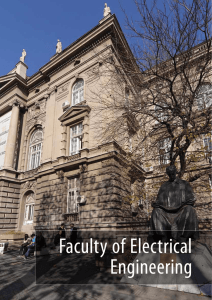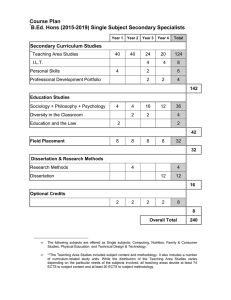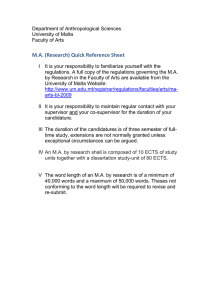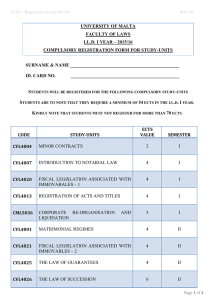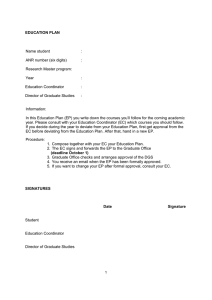Faculty of Power and Electrical Engineering
advertisement
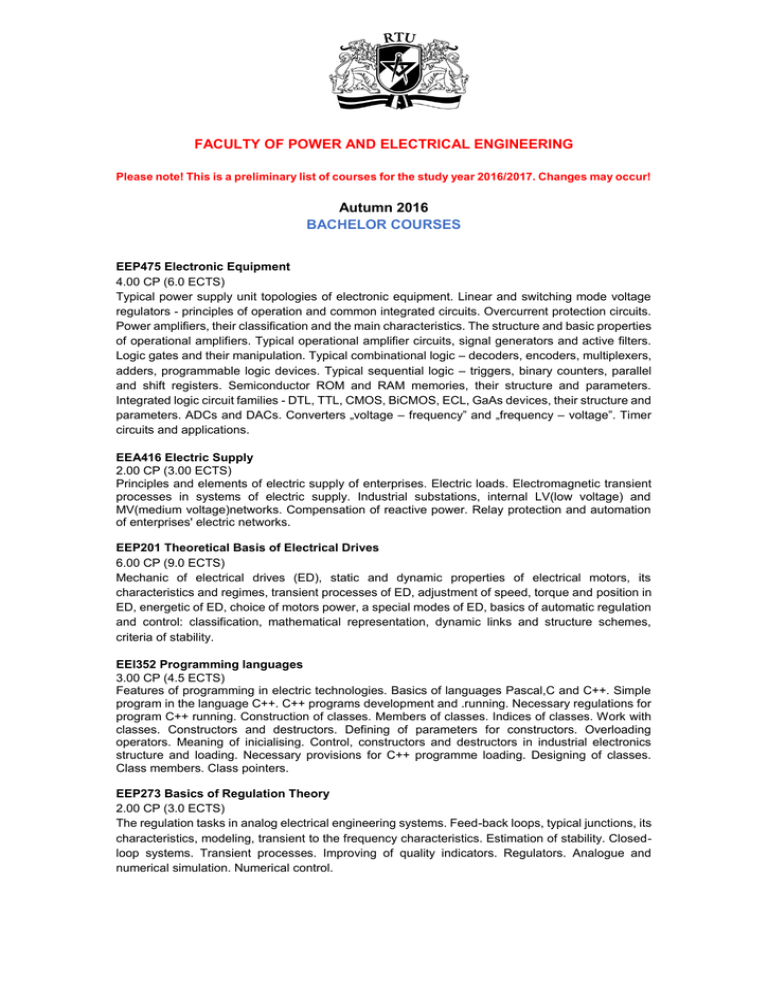
FACULTY OF POWER AND ELECTRICAL ENGINEERING Please note! This is a preliminary list of courses for the study year 2016/2017. Changes may occur! Autumn 2016 BACHELOR COURSES EEP475 Electronic Equipment 4.00 CP (6.0 ECTS) Typical power supply unit topologies of electronic equipment. Linear and switching mode voltage regulators - principles of operation and common integrated circuits. Overcurrent protection circuits. Power amplifiers, their classification and the main characteristics. The structure and basic properties of operational amplifiers. Typical operational amplifier circuits, signal generators and active filters. Logic gates and their manipulation. Typical combinational logic – decoders, encoders, multiplexers, adders, programmable logic devices. Typical sequential logic – triggers, binary counters, parallel and shift registers. Semiconductor ROM and RAM memories, their structure and parameters. Integrated logic circuit families - DTL, TTL, CMOS, BiCMOS, ECL, GaAs devices, their structure and parameters. ADCs and DACs. Converters „voltage – frequency” and „frequency – voltage”. Timer circuits and applications. EEA416 Electric Supply 2.00 CP (3.00 ECTS) Principles and elements of electric supply of enterprises. Electric loads. Electromagnetic transient processes in systems of electric supply. Industrial substations, internal LV(low voltage) and MV(medium voltage)networks. Compensation of reactive power. Relay protection and automation of enterprises' electric networks. EEP201 Theoretical Basis of Electrical Drives 6.00 CP (9.0 ECTS) Mechanic of electrical drives (ED), static and dynamic properties of electrical motors, its characteristics and regimes, transient processes of ED, adjustment of speed, torque and position in ED, energetic of ED, choice of motors power, a special modes of ED, basics of automatic regulation and control: classification, mathematical representation, dynamic links and structure schemes, criteria of stability. EEI352 Programming languages 3.00 CP (4.5 ECTS) Features of programming in electric technologies. Basics of languages Pascal,C and C++. Simple program in the language C++. C++ programs development and .running. Necessary regulations for program C++ running. Construction of classes. Members of classes. Indices of classes. Work with classes. Constructors and destructors. Defining of parameters for constructors. Overloading operators. Meaning of inicialising. Control, constructors and destructors in industrial electronics structure and loading. Necessary provisions for C++ programme loading. Designing of classes. Class members. Class pointers. EEP273 Basics of Regulation Theory 2.00 CP (3.0 ECTS) The regulation tasks in analog electrical engineering systems. Feed-back loops, typical junctions, its characteristics, modeling, transient to the frequency characteristics. Estimation of stability. Closedloop systems. Transient processes. Improving of quality indicators. Regulators. Analogue and numerical simulation. Numerical control. MASTER COURSES EEP504 Microprocessors - based Automation Systems (graduate) 3.00 CP (4.5 ECTS) The course has been composed for any student who has elementary knowledge in the field of electrical engineering and programming and wish to gain basic practical skills of utilization of microcontrollers MSP430. The course briefly discusses basic design features of microcontrollers MSP430 in the context of various architectures of microprocessors, microcontrollers and peripheral devices. The most significant part of the course is devoted to the programming of MSP430 – including the programming of digital I/O, watchdog and arithmetical operations. The course is based on practical studies and assumes active individual training of the students in the laboratory or at home. EEP433 Automated Electrical Drive (graduate) 3.00 CP (4.50 ECTS) Electrical drives and automation by usage of the DC, AC induction and synchronous type motors. Tracking drives, programmable, adaptive and self-organizing systems. Electric magnets, electricmagnetic clutches. Choice of the motors and its protection. Reliability of the systems. EEP585 Simulation of Electrical Processes (graduate) 5.00 CP (7.50 ECTS) The subject is devoted to simulation of electrical circuits. Principles of composing of differential equation systems for electrical equipment, of their numerical calculation, and its features in MATLAB are given in the first significant part of the course. The second part is devoted to PSPICE circuit description language and to the features of its practical utilization. The theoretical part of the course deals with solutions of ordinary differential equation systems and basics principles of PSPICE. The practical (most important) part of the course includes various examples of simulation of electrical equipment. EEP584 Theory of Electronic Converters of Electrical Energy (graduate) 4.00 CP (6.00 ECTS) General theory of energy conversion. Rectifiers and line-frequqncy controlled inverters. Autonomous inverters. Current-source, voltage-source and resonance mode inverters. Modulation methods. BUCK and BOOST converters. Frequency converters with high-frequency links. Matrix type converters. Cycloconverters. EEP345 Unconventional Systems of Energy Conversion and Accumulation (graduate) 3.00 CP (4.50 ECTS) Wind power stations, turbines, adjusting, connections to the Main, small power hydraulic plants, its adjusting, electric machines of the special construction, photovoltaics, piezo generators, piezo motors, motion and movement sensors, low voltage inverters, adjusting, regulation, batteries, UPS. EEP582 Control Technique with Microprocessor Controllers (graduate) 3.00 CP (4.5 ECTS) Process control systems with one and two tanks of capacities. Control loops. Industrial measurement equipment for flow, pressure, level and temperature. Controlled valves, programmable controllers, functions, P, PI, PID control loops, optimal setting techniques.
